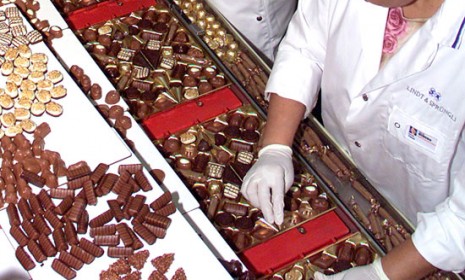Is the secret to winning a Nobel Prize... chocolate?
The average Swiss citizen consumes about 120 bars of chocolate every year, and the country produces an exceptional number of geniuses

A free daily email with the biggest news stories of the day – and the best features from TheWeek.com
You are now subscribed
Your newsletter sign-up was successful
Does chocolate make you smarter? Well, it might, at least coincidentally. According to a "very tongue-in-cheek" report published this week by the New England Journal of Medicine, countries with the highest annual chocolate consumption rates produce more Nobel Prize winners than other nations — and the data, for some reason, correlates surprisingly well. But before you start scarfing down Hershey bars in the hopes of becoming the next Mo Yan, this year's winner of the Nobel Prize for Literature, here's what you should know:
How did this study come about?
Franz Messerli, a noted cardiologist and published scientific author at New York's St. Luke's Roosevelt Hospital, says he came up with the "silly" idea to plot the chocolate consumption data after being asked to peer review an article on the cognition-boosting power of flavanols, the substance that gives green tea, red wine, and chocolate their purported health benefits. He plugged in data related to chocolate intake in 23 countries and a Wikipedia list ranking countries by Nobel laureates per capita. "I could not believe my eyes," Messerli tells Reuters. Nearly all the countries lined up on a graph, with a clear link between higher chocolate intake and Nobel Prize winners. "Not only was the correlation...very significant," adds Kevin Charles Redmon at NPR, "but the probability that the distribution was due to chance — what researchers call the 'p-value' — was tiny."
The Week
Escape your echo chamber. Get the facts behind the news, plus analysis from multiple perspectives.

Sign up for The Week's Free Newsletters
From our morning news briefing to a weekly Good News Newsletter, get the best of The Week delivered directly to your inbox.
From our morning news briefing to a weekly Good News Newsletter, get the best of The Week delivered directly to your inbox.
So which country eats the most chocolate?
The Swiss, naturally, says Brian Palmer at Slate. On average, every Swiss man, woman, and child consumes about 120 bars of chocolate every year. And, according to Messerli's calculations, Switzerland "ranks second behind Sweden in laureates per capita. (The author accuses the Sweden-based Nobel committee of favoritism.)" Despite an inauspicious climate for growing cocoa, the Swiss came to "dominate the chocolate world" thanks to several innovations, most notably Daniel Peter's 1875 discovery that cocoa powder combines exceptionally well with local milk, says Palmer. Voilà: Milk chocolate.
How does the U.S. rank?
Americans are somewhere in the middle of the pack. If the U.S. wants to produce more laureates, jokes Messerli, it would have to drastically increase its cocoa intake — by 275 million pounds per year.
A free daily email with the biggest news stories of the day – and the best features from TheWeek.com
Why is there a link between chocolate and Nobel distinction?
The answer could be really simple, says Slate's Palmer: "Wealth." Chocolate is a luxury good, and countries with more money typically have better education systems. Countries that grow actual cocoa — like the Ivory Coast, Indonesia, and Ghana — typically don't consume it.
Are we supposed to take this study seriously?
Not really. "Personally," says Messerli, "I feel that milk chocolate makes you stupid. Dark chocolate is the way to go… if you want a physics Nobel Prize it pretty much has got to be dark chocolate."
-
 Political cartoons for February 22
Political cartoons for February 22Cartoons Sunday’s political cartoons include Black history month, bloodsuckers, and more
-
 The mystery of flight MH370
The mystery of flight MH370The Explainer In 2014, the passenger plane vanished without trace. Twelve years on, a new operation is under way to find the wreckage of the doomed airliner
-
 5 royally funny cartoons about the former prince Andrew’s arrest
5 royally funny cartoons about the former prince Andrew’s arrestCartoons Artists take on falling from grace, kingly manners, and more